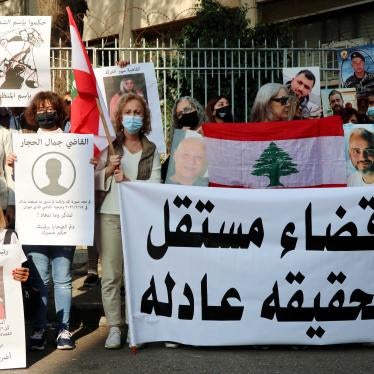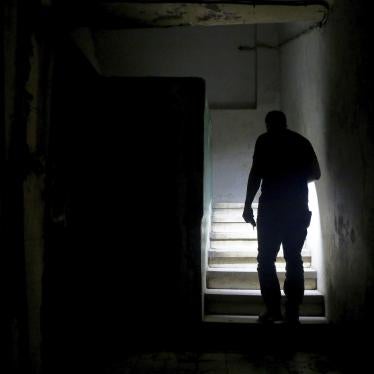Prominent Lebanese lawyer Nizar Saghieh, who heads the local rights-based organization Legal Agenda, faces the threat of sanction – including possible disbarment – for speaking out against the Beirut Bar Association’s decision to arbitrarily and unlawfully limit what lawyers can say in public. Saghieh will appear before the Council of the Beirut Bar Association tomorrow.
The amendments to the Bar Association’s Legal Code of Ethics, approved by the council in March, restrict lawyers from participating in media interviews, conferences, and panels about legal issues, or even discussing such legal issues on social media without first obtaining approval from the bar association’s head. The amendments also restrict lawyers from criticizing members of the Beirut Bar Association’s council, including the president, during council elections. All lawyers who wish to practice in Lebanon are required to be members of the Beirut or Tripoli Bar Associations, which are set up and regulated under Lebanese law.
Saghieh, who publicly protested the decision, was summoned by the council on March 28 and April 4, and he believes that he may be disbarred in retaliation for his criticism.
Thirteen lawyers including Saghieh have appealed the council’s decision, and on May 4 the Beirut Court of Appeals will rule on the legality of the new restrictions. The United Nations Special Rapporteur on the independence of judges and lawyers has previously emphasized that “codes of professional conduct for lawyers should respect their fundamental rights,” including freedom of expression.
This comes amid an alarming series of actions by Lebanese authorities to muffle free expression.
On March 30, the General Directorate of State Security summoned Jean Kassir, co-founder of independent media outlet Megaphone, in response to an online post by Megaphone titled “Lebanon ruled by fugitives from justice.” The next day, the Cybercrimes Bureau summoned journalist Lara Bitar, editor-in-chief of The Public Source, in response to an article examining the role of the Lebanese Forces, a political party and former armed group, in transporting toxic wastes into Lebanon in the 1980s.
Following protests and condemnation by Lebanese civil society organizations, the investigation against Kassir was dropped, and Bitar’s case was moved from the Cybercrime Bureau to the Publications Court, the court that should normally deal with such cases. That case remains pending.
These developments risk drastically reducing the space for civic life and free expression in Lebanon, right when people are facing increasing deprivation amid government stagnation and an economic crisis. Lebanese authorities, including the Beirut Bar Association and judiciary, should protect the right to free expression rather than limit it.










